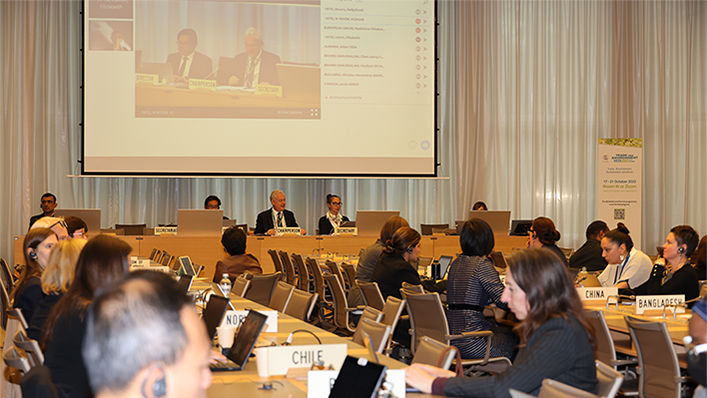
China, the European Union and India reported on key environmental policies and responded to questions relating to their respective programmes as well as their coherence with WTO rules. China reported on its framework for achieving carbon neutrality and expressed support for the WTO as the main channel for coordinating trade policies in pursuit of cooperation in global climate governance.
The European Union provided updates on its Carbon Border Adjustment Mechanism (CBAM) and presented its proposal to curb EU-driven deforestation, noting that such discussions underlined the Committee’s commitment to transparency. Many members, responding to the EU’s presentation, reiterated the need to avoid unilateral measures and to ensure consistency with WTO rules.
India presented its renewable energy and energy efficiency measures. It also raised concern over the “increasing use of unilateral measures impacting trade which are sought to be justified as environmental measures.” Several members, while affirming support for “legitimate” environmental measures, echoed this concern.
Post-MC12 work
Members explored ways to enhance the Committee’s work. The CTE chair, Ambassador Simon Manley of the United Kingdom, sought members’ ideas on how best to take forward the MC12 outcome document in which members had recognized the important role of the multilateral trading system in promoting sustainable development and the role of the Committee as the forum for dialogue on the relationship between trade and environmental measures. Suggestions on ways forward included holding thematic discussions, coordinating with other committees on cross-cutting issues, and examining support for developing and least-developed country members. Several members added that the WTO must not only recognize environmental challenges but also commit to address them.
Transparency
Members notified a record number of environmental measures in 2021, according to a presentation by the Secretariat on the WTO Environmental Database. Nineteen per cent of notifications were environment-related last year compared to 8 per cent in 1997.
Trade and Environment Week
The Committee heard reports on the High Level Opening event as well as on the 16 other events held during Trade and Environment Week .
The events covered a wide range of issues, including traceability of supply chains, plastics pollution, climate change and adaptation, sustainable development, the circular economy transition, and environmental goods and services. Trade and Environment Division Director Aik Hoe Lim said the week featured over 80 speakers and attracted over 1,000 participants in person and online, generating active engagement across the WTO membership on the need to make trade more sustainable, resilient and inclusive.
Other initiatives
Coordinators of the Informal Dialogue on Plastics Pollution and Sustainable Plastics Trade (IDP), Fossil Fuel Subsidy Reform (FFSR) and the Trade and Environmental Sustainability Structured Discussions (TESSD) provided members respective updates on recent meetings.
Members also heard a presentation on negotiations towards the Agreement on Climate Change, Trade and Sustainability (ACCTS), which has so far held 10 rounds of negotiations in September; and the recently signed Singapore-Australia Green Economy Agreement, which seeks to promote greater trade and investment in environmental goods and services.
Switzerland also shared its experience in concluding cooperation agreements under Article 6 of the Paris Agreement with several partner countries defining the conditions for the transfer of Internationally Transferred Mitigation Outcomes (ITMOs).
Next meeting
The Committee’s next meeting will be in the first quarter of 2023.
Share
Reach us to explore global export and import deals